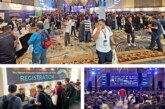
Alibaba Cloud unveiled a series of innovative products at its 12th annual Apsara Conference, highlighting the technology pioneer’s commitment in helping people adapt to the more digitized world and accelerate customers’ digital transformation during and after the pandemic.
A highlight is Alibaba Cloud’s first cloud computer, a palm-sized personal computer which, despite being just about 60 grams and as light as an egg, offers high-performance computing, thanks to robust back-end cloud resources. By simply connecting the cloud computer with a normal computer screen , a user can access almost unlimited computing resources anytime, anywhere, while paying on a subscription model or for the actual cloud consumption.
With robust computing power, the cloud computer can reduce the rendering time of one frame high-resolution animation from 90 minutes using a traditional PC, down to only 10 minutes. In addition, the cloud computer’s system upgrades are conducted online, saving a big chunk of the normally heavy cost of PC machine upgrades and maintenance in traditional office settings. Through Alibaba Cloud’s self-developed app-streaming protocol, which is designed for synergy between the cloud and the device, users can also purchase and access licensed apps and programs such Linux and Windows as well as various office applications. All user data will be stored on cloud for datacenter-grade security and protection measures. Available initially for enterprise customers, the cloud computers will be also available for purchase by individual consumers in the near future.
Alibaba Cloud also unveiled its autonomous logistics robot for last-mile deliveries. Developed by the Alibaba DAMO Academy, the global research initiative by Alibaba Group, the delivery robot can carry 50 packages at one time and cover 62 miles (or 100 kilometres) on a single charge. It is estimated the mobile robot should be able to deliver as many as 500 packages a day to one designated community or campus, meeting the rising demand for speedy last-mile delivery in China. Online shopping is booming there, with 200 million packages delivered daily and expectations that will rise to 1 billion packages per day in the coming years.
Supported with reinforced learning technologies, the intelligent robot can schedule its route even in a crowded environment. With proprietary, high-definition positioning technology, the robot can operate even where there’s weak or no GPS signal. Leveraging a self-developed heterogeneous computing platform, 3D Point Cloud Semantic Segmentation (PCSS) technology and deep learning, the robot can also identify obstacles and predict the intended movement of passengers and vehicles a few seconds ahead of time to enhance safety.
Consumers can use either the Cainiao or Taobao mobile apps to select a preferred timeslot during the day for delivery. The robot then arrives at the designated destination, where users retrieve their packages simply by entering a passcode they receive in the app, once the robot arrives.
A slew of cloud-native products were unveiled during the Conference:
- Cloud Lakehouse: This is the next-generation big data architecture which can deliver significant data-based values and intelligence through cross-platform computing, intelligent cache, hot/cold data separation, storage improvement and performance acceleration.
- Sandboxed-Container 2.0: Alibaba’s cloud-native container service for Kubernetes supports clusters that provide sandboxed container runtimes. The new Sandboxed-Container 2.0 enables customers to run applications in lightweight sandboxed environments with faster speeds and reduced cost of runtime resources.
- PAI-DSW 2.0: The latest Cloud-native Machine-learning Interactive Development Platform by Alibaba. It aims to provide an optimal environment for developers that is easy to use, compatible with community plug-ins and supports multi-development environments like JupyterLab?WebIDE and Terminal.
- Lindorm: The cloud-native multi-model database that is used to support the Alibaba Group ecosystem, is introduced to benefit the wider Alibaba Cloud ecosystem. Lindorm is a cloud-native database, with affordable storage and flexible processing characteristics. It is designed for applications with massive processing requirement for a mixture of unstructured, semi-structured, and structured data.
The conference, named “Leap Into the Future of Digital Intelligence,” was entirely hosted online for the first time, with over 100 virtual forums on topics ranging from cloud computing, IoT to machine learning and industrial AI solutions.
For more information about the Apsara Conference, please visit the website: https://www.alibabacloud.com/apsara-conference-2020
![]()







